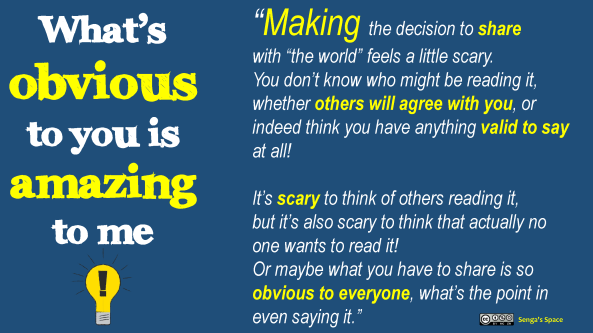
Applied Practice in Context – Week 32
Had I sat down to design my perfect course of study, I doubt I could have created one that fits my needs better. I have blogged since 2011 and this has taken on refreshed importance during Mindlab. I have revisited previous thinking and confirmed the existence of a collaborative mindset.


- White, S. (2011, November 11.) What’s obvious to you is amazing to me.
As I reflect on the goals set in July 2018, I can see progress with all of them, but most particularly with #1 and #3. Momentum continues to build and won’t cease at the end of this course, as I embark on my NZEI scholarship, investigating collaborative practice in the UK.

My practice hasn’t altered dramatically through this journey, but there has been noticeable development in my leadership; with a renewed conviction to seek a wider audience with the power to instigate systemic change; and a need to convince political leaders and educational changemakers of the place librarians can inhabit in learning outcomes for students in all New Zealand schools. It has also encouraged me to persevere in my approach to advocating for those changes, not only within my sphere of influence but those yet within my reach.

Stage 1: Problem identification
Siloed libraries, ineffectively managed and with no collaborative opportunities, will only ever, at best, be on the fringes of student learning. Comprehensive research underscores that every student in every school deserves equitable access to the unique insight, experience, and knowledge that a professional librarian offers if they’re included in curriculum and lesson planning and implementation.
I have begun to see even more possibilities for collaborative practice when an experienced librarian, working with a new teacher, could take the lead in the partnership, regardless of which profession they belong to.

I am repeatedly climbing the ladder of influence, steadily reaching the middle and top rungs. Mindlab has contributed to me now frequently reaching the top rungs, understanding WHY I’m there and WHERE to find the NEXT ladder.
Stage 2: Observation and analysis

It’s about relationships, conversations, a “servant” attitude, and collaborations of all sizes.
Partnering with my teaching colleague Jacque last year has crystalised the true benefit of collaboration – bringing together two sets of professional expertise within an environment of mutual respect, which transports the learning from merely transactional to something contextual and transformational. This has become even more obvious as Jacque moved schools this year, and I can see the gap emerge with her leaving.
In analysing the qualitative data collected, this perspective is validated. However, I also acknowledge there’s a vast number of teachers who haven’t participated. Is that because they don’t value the library, haven’t worked with a librarian, don’t see the need to work with one or are ambivalent to even considering it. How can I affect change in those schools?
Stage 3: Abstract reconceptualization
Becoming more familiar with the teaching profession code of practice offers new ways of considering how to frame these relationships with a strong teacher focus.

Being able to mesh my librarian perspective with that of teachers allows for deeper and more satisfying connections to their knowledge, and participation in professional conversations. The teaching code of practice provides numerous switches and buttons to activate the light!

Stage 4: Active experimentation
Acting on these new ideas will not be easy. I am still in the space between reconceptualisation and active experimentation. However, an opportunity may be on the horizon with numerous education reviews currently underway, a first-term government and continuing international research, I will find the right intersections in my professional roads.

References:
Ministry of Education (2017). Our code, our standards. Retrieved from https://educationcouncil.org.nz/content/our-code-our-standards
Osterman, K. F., & Kottkamp, R. B. (2015). Reflective practice for educators: professional development to improve student learning. Retrieved from https://app.themindlab.com/media/77396/view
Scardamalia, M., & Bereiter, C. (2006). Knowledge building: Theory, pedagogy, and
technology. In K. Sawyer (Ed.), Cambridge Handbook of the Learning Sciences (pp. 97-118). New York: Cambridge University Press. Retrieved from http://ikit.org/fulltext/2006_KBTheory.pdf
White, S. (2011, November 11.) What’s obvious to you is amazing to me. Senga’s Space. [web log post.] Retrieved from https://sengawhite.nz/2011/11/29/whats-obvious-to-you-is-amazing-to-me/